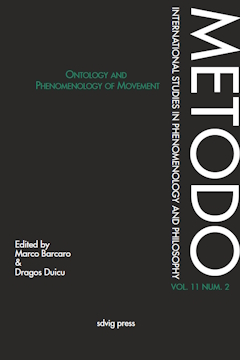Journal | Volume

Ontology and phenomenology of movement
Volume 11 (2)
Details | Table of Contents
Aristotle and Koyré: from motion as process of formal actualization to inertial motion as state
On Zeno's paradoxes of motion (and beyond)
pp.15-68
https://doi.org/10.19079/metodo.11.2.15
Phenomenology in motion
from the principle of manifestation to the principle of tension
pp.69-90
https://doi.org/10.19079/metodo.11.2.69
Time and movement
a phenomenological problem
pp.91-120
https://doi.org/10.19079/metodo.11.2.91
La concept de mouvement dans l'Auseinandersetzung d'Eugen Fink avec la pensée grecque
pp.121-142
https://doi.org/10.19079/metodo.11.2.121
The problem of movement in phenomenology between the philosophy of reflection and Neoplatonism
pp.143-167
https://doi.org/10.19079/metodo.11.2.143
Life in motion
Eugen Fink and Emmanuel Levinas
pp.167-204
https://doi.org/10.19079/metodo.11.2.167
Du "mouvement dansant" au "se-mouvoir"
Les phénoménologies du mouvement chez Erwin Straus (1930-1935)
pp.205-222
https://doi.org/10.19079/metodo.11.2.205
Le tout de l'appartenance et le mouvement du monde
remarques sur un essai contemporain de cosmologie phénoménologique
pp.249-276
https://doi.org/10.19079/metodo.11.2.249
Synästhetische Einheit der Wahrnehmung und Bewegungserfahrung
pp.277-314
https://doi.org/10.19079/metodo.11.2.277
Movement and meaning
an investigation in early intersubjective development
pp.315-354
https://doi.org/10.19079/metodo.11.2.315
Da-sein as being elsewhere
on migration as transformative movement
pp.355-392
https://doi.org/10.19079/metodo.11.2.355Publication details
Journal: Metodo
Volume: 11
Issue: 2
Year: 2024
DOI: 10.19079/metodo.11.2
Full citation:
Barcaro Marco, Duicu Dragoş (2024) Ontology and phenomenology of movement. Metodo 11 (2).


